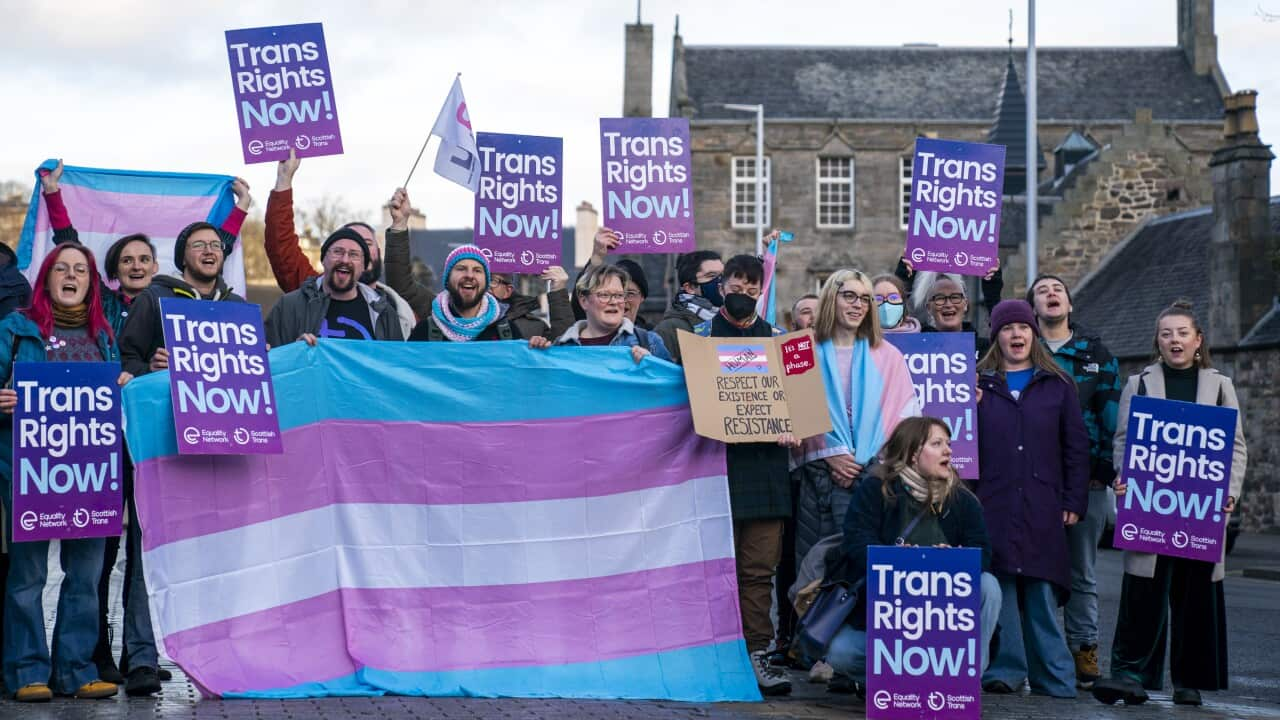The UK government has announced it will block a Scottish bill that makes it easier and less intrusive for people to change their legally recognised gender.
This is the first time the government has invoked the power that allows it to veto Scottish bills that it believes would have an adverse affect on UK-wide law.
It comes after weeks of tension between the UK and Scottish governments during the bill's debate.
What bill does the UK government have an issue with?
The Gender Recognition Reform (Scotland) Bill was passed by Scotland’s parliament last month, with First Minister Nicola Sturgeon hailing it as an "historic day for equality".
It made Scotland the first nation in the United Kingdom to support a self-identification process for changing a person's legally recognised gender, removing the need for a medical diagnosis of gender dysphoria.
The legislation would also reduce the amount of time a person is required to live as the gender they identify as before applying for the legal change, and lower the minimum age from 18 to 16.
UK LGBTIQ+ rights charity Stonewall said that the bill aligns Scotland with "leading international practice" that has been endorsed by the United Nations and adopted by 30 other countries, including Australia, , Canada, and Ireland.
, with residents aged 16 and over able to apply to have the sex listed on their birth certificate changed without parental approval or any kind of medical intervention to affirm their gender.
How is the UK government able to veto Scottish legislation?
The Scotland Act 1998 is the law that created a devolved Scottish parliament and government after a 1997 referendum.
It gives the Scottish parliament the power to pass laws on local issues without also requiring the approval of the UK parliament.
But section 35 of the Act affords the UK government provisions to block a bill becoming law if it deems it will have an adverse effect on matters where the national government retains ultimate jurisdiction.
That move prohibits the Scottish parliament's presiding officer from submitting a bill for royal assent, which it needs to become law.
Why is the UK government blocking the bill?
The UK government's Scotland minister Alister Jack announced on Monday that after "thorough and careful consideration of all the relevant advice and the policy implications" he had concluded that invoking section 35 was the "necessary and correct course of action".
"I am concerned that this legislation would have an adverse impact on the operation of Great Britain-wide equalities legislation," he said in a statement, adding he'd not taken the decision "lightly".
Some UK ministers had also expressed concern that the bill could lead to "gender tourism".
Other opponents argued the changes could pose a threat to the safety of women and girls by making it easier for predatory men to access single-sex spaces, such as schools, toilets, and domestic violence shelters.

Alister Jack is the UK government's Scotland minister. Source: Getty / Anadolu Agency
"At the moment, 350 million people live in systems of legal recognition based on self-determination, and there is not, to my knowledge, one single administrative or judicial finding that this system is actually abused by predatory males," he told the Thomson Reuters Foundation in December.
"The existence of trans women and the very real risk of gender and sex-based violence are both valid concerns, but it's not valid to conflate them in the way parts of the public debate are trying to."
Stonewall accused the UK government of choosing "the nuclear option", saying the move "significantly undermines the devolution settlement and will unlock constitutional and diplomatic strife".
"It is a matter of grave and profound regret that the prime minister has allowed trans people's lives to be used as a political football," it said in a statement on Monday.
"This is not governing with compassion. These are not the actions of a government that can stand on the international stage as a credible defender of LGBTQ+ rights."
What could happen next?
Mr Jack said the Scottish government could choose to bring an amended version of the bill back to parliament for consideration.
But Ms Sturgeon indicated a legal challenge would be mounted against the UK government's decision, saying she would defend the legislation and "stand up for Scotland's parliament."
"This is a full-frontal attack on our democratically elected Scottish parliament and its ability to make its own decisions on devolved matters," she said on Twitter.
"If this Westminster veto succeeds, it will be the first of many."
Experts said it remained to be seen whether the UK government blocking the bill would fuel the Scottish independence movement.
"The policy area is complex and one on which most Scots are unlikely to have strong views," Professor of public policy at Edinburgh University, James Mitchell, said.
"If the SNP [Scottish National Party] succeed in presenting this as interference then it will play into their argument for independence though it divides the SNP itself so this may not be quite as easy as the leadership hope."
The UK Supreme Court ruled in November that Scotland can't hold a second independence referendum without Westminister’s approval.
With Reuters



